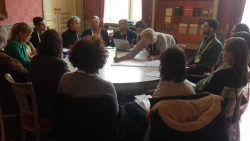ECsafeSEAFOOD International Stakeholder Event and Open Science Conference – A wealth of potential
The event was the culmination of the four-year ECsafeSEAFOOD project, which focused on seafood consumer needs and concerns, marine toxins in seafood and the environment, toxicity of seafood contaminants, evaluation of seafood monitoring data, and rapid detection tools for environmental contaminants. This unique event was held at the Royal Flemish Academy of Science and the Arts (KVAB), Brussels, Belgium and brought together 94 attendees from around the world. The latest developments in the evolving field of seafood safety were examined through a variety of activities both formal and informal. Moderated panel discussions and a plenary programme with keynote speakers shared time with a theatrical “Science Slam” and other informal networking opportunities. A dedicated half-day International Stakeholder Event addressed national and international policy makers in the fields of food safety, environment and public health, food safety authorities, the seafood industry and consumer organisations. There were presentations and discussions of novel research results and applications followed by interactive round tables allowing researchers to engage in detailed conversations about important questions relevant to their line of work, including potential end users and practical applications, ideas for transfer activities, possible barriers to transfer and eventual impact. ECsafeSEAFOOD project coordinator, Dr António Marques said: “The brainstorming session with seafood safety experts and stakeholders gave participants the opportunity to discuss the relevance of key ECsafeSEAFOOD results for the field of seafood safety. Each group provided strategies to ensure wide societal application of the outcomes. The session also served as a platform to strengthen the links between science, policy, industry regulators and industrial organisations.” Among the important results for consumers are the development of FISHCHOICE, an interactive online tool that consumers can use to weigh up the benefits and risks associated with the seafood they eat, and a set of seafood safety guides for consumers, industry and policy makers, which are due to be published in March 2017. Following the Stakeholder Event, a one-and-a-half-day Open Science Conference presented the latest scientific data on ECsafeSEAFOOD topics to a broad audience. Most attendees participated in both events, taking advantage of the excellent opportunity for industry and science stakeholders to exchange experiences and generate new ideas to drive forward research vital to keeping seafood demonstrably safe. Some key scientific results discussed include the development of new contaminant detection methods as well as insight into the occurrence of unregulated contaminants in seafood, the effect of cooking on contaminant levels and the effect of microplastics on contaminant levels in fish. Dr Marques said: “The ECsafeSEAFOOD final conference was a huge success. All attendees actively engaged in and enjoyed the conference, with participant feedback deeming it an enriching event. This event provided a platform for research and industry representatives to diversify their cross-sectorial knowledge, strengthen their existing partnerships and build new opportunities.” For more information about ECsafeSEAFOOD and its final conference, please visit: www.ecsafeseafood.eu or contact Tanja Calis, email: tanja@aquatt.ie. For all the latest updates please follow ECsafeSEAFOOD on Twitter (@ECsafeSEAFOOD) and like the project conference page on Facebook (www.facebook.com/ECsafeSEAFOODConference). Notes for Editors The ECsafeSEAFOOD project was launched in February 2013 and was funded by the European Union's Seventh Framework Programme for Research and Technological development (FP7/2007-2013) under Grant Agreement n°311820. The Portuguese Institute for the Sea and Atmosphere (IPMA, I.P.) coordinated the project. The ECsafeSEAFOOD consortium comprises 17 partner organisations from 10 countries.
Keywords
Countries
Austria, Belgium, Bulgaria, Cyprus, Czechia, Germany, Denmark, Estonia, Greece, Spain, Finland, France, Croatia, Hungary, Ireland, Italy, Lithuania, Luxembourg, Latvia, Malta, Netherlands, Poland, Portugal, Romania, Sweden, Slovenia, Slovakia, United Kingdom



